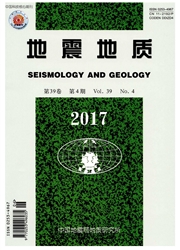

 中文摘要:
中文摘要:
高震级地震是指能沿发震活动断层产生地震地表破裂且震级M≥7.0的地震。高震级地震发生地点的识别是活动断层长期滑动习性和古地震研究的科学目标之一,也是地震预测预报的关键问题。地震地质学标志研究及其应用是地震预测研究的重要组成部分,不仅可以推动地震科学的发展、特别是地震监测预报学科的进步,对地震灾害预防和有效减轻可能遭遇的地震灾害损失也有积极的推动作用,更是政府、社会和科学界十分关注、迫切需要解决的地震科学问题。2008年汶川地震(M8.0)、2010年玉树地震(M7.1)、2013年芦山地震(M7.0)、2015年尼泊尔廓尔喀(Gorkha)地震(M_W7.8)在青藏高原及其周边地区相继发生,吸引了国内外众多地学专家的关注,发表了一大批高质量的研究成果,为高震级地震地质标志的分析与研究提供了非常好的基础。文中首先解剖、分析了这些地震的发震构造模型、发震断层的地震破裂习性、地壳介质力学特性、应力-应变环境和中小地震活动性等特征,然后归纳、总结出高震级地震其发震断层或发生地点的5种共性特征,即5种不同类型的地震地质学标志,讨论了地震地质标志的可靠性问题;最后结合1:5万活动断层填图成果,参考已有区域地震层析成像和断层闭锁相关成果,对华北构造区和青藏高原及其邻近地区的未来高震级地震危险区进行了试验性识别,这些地震地质标志的科学性和适用性有待于今后进一步的完善与时间的检验。
 英文摘要:
英文摘要:
High-magnitude earthquake refers to an earthquake that can produce obvious surface ruptures along its seismogenic fault and its magnitude M is at least equal to 7.0. Prediction and identification of locations, where the high-magnitude earthquakes will occur in potential, is one of the scientific goals of the studies on long-term faulting behavior of active faults and paleo-earthquakes, and is also the key problem of earthquake prediction and forecast. The study of the geological and seismological signatures for identifying MI〉 7.0 earthquake risk areas and their application is an important part of seismic prediction researches. It can not only promote the development of earthquake science, especially the progress of earthquake monitoring and forecasting, but also be positive for earthquake disaster prevention and effective mitigation of possible earthquake disaster losses. It is also one of the earthquake science problems which the governments, societies and the scientific communities are very concerned about and need to be addressed. Large or great earthquakes, such as the 2008 Wenchuan earthquake (M8.0), the 2010 Yushu earthquake(M7.1), the 2013 Lushan earthquake(M7.0)and the 2015 Gorkha earthquake (Mw7.8), have unceasingly struck the Qinghai-Tibet Plateau and its surrounding areas, which have been attracting attention of a large number of geoscientists both at home and abroad. Owing to good coverage of the seismic networks and GPS sations, a lot of high-quality publications in seismicity, crustal velocity structure, faulting beihavior have been pressed, which gives us a good chance to summarize some common features of these earthquakes. In this paper, seismogenic structural model of these earthquakes, faulting behavior of seismogenic faults, crustal mechanical property, recent straining environment and pre-earthquake seismicity are first analyzed, and then, five kinds of common features for the sismogenie faults where those earthquakes occurred. Those five kinds of commom features are, in fac
 同期刊论文项目
同期刊论文项目
 同项目期刊论文
同项目期刊论文
 期刊信息
期刊信息
